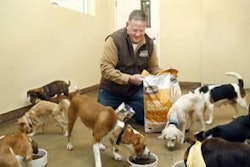All new for Petfood Forum 2014: thought leaders in pet nutrition, pet retailing/marketing and petfood regulatory/safety will head discussions that wrap up the concurrent session part of Petfood Forum. These discussion sessions will each feature several industry experts offering perspective on the issue, then open up to the floor for full audience participation and Q&A. The discussion sessions will take place from 10:15 am to 12:00 pm on Wednesday, April 2, just before lunch and the closing keynote.
Discussion sessions include:
-
Nutritional sustainability of petfoods: can we create a more sustainable system?
Led by Kelly Swanson, PhD, associate professor, Department of Animal Sciences/Division of Nutritional Sciences at the University of Illinois at Urbana-Champaign (UIUC), based on a paper he co-authored in early 2013 that looked at ingredient selection, nutrient composition, digestibility and consumption rates and other factors affecting the sustainability of petfood. Competition with livestock feeds and human foods, high consumer demands and pet anthropomorphism greatly impact the industry. This session will foster discussion of the opportunities and challenges pertaining to sustainability.
Swanson received a doctorate in nutritional sciences from UIUC and did post-doctoral work there on functional genomics. Currently, he teaches companion animal nutrition to veterinary, undergraduate and graduate students, and has been named to the "List of Teachers Ranked as Excellent" 10 times. As a leader in companion animal nutrition and nutrigenomics, primarily in gastrointestinal health and obesity, Swanson heads a research program that has gained international recognition, highlighted by over 70 invited lectures at scientific meetings in 10 countries, many international research collaborations, invited review articles, awards and service on three editorial boards. He has published numerous peer-reviewed manuscripts and invited reviews, book chapters, conference proceedings and scientific abstracts.
Joining Swanson will be Andrea J. Fascetti, VMD, PhD, DACVIM, DACVN, professor of nutrition at the School of Veterinary Medicine at University of California-Davis, who will comment on nutritional sustainability from the veterinarian's and pet owner's perspectives. Fascetti holds a doctoral degree in nutrition from UC-Davis and veterinary medical degree from the University of Pennsylvania School of Veterinary Medicine. She is a diplomate of the American College of Veterinary Internal Medicine and American College of Veterinary Nutrition and the service chief for the Nutrition Support Service in the Veterinary Medical Teaching Hospital at UC-Davis.
Jason Rokey, purchasing manager for Lortscher Animal Nutrition, will also join the panel. Based in Bern, Kansas, USA, he joined Lortscher in 2006. Rokey's expertise includes developing inventory parameters for over 700 ingredients, overseeing all aspects of the ingredient supply chain, directing and administering Lortscher's vendor assurance program and designing hedging programs to meet the specific needs of clients. In his role, he works with partners of both goods and services to meet the ever changing demands of the industry, including initiatives aimed at building lasting and sustainable ingredient supplies.
Led by Mark Kalaygian, editor in chief of Pet Business magazine. Consolidation among distributors to the US pet specialty channel has been heating up, fueled by outside investment, and has significant implications for pet retailers, especially small, independent pet stores. A fewer number of larger distributors could make it more difficult for independents to maintain the variety of products they use to differentiate themselves from large pet store chains-a differentiation that is often noticeable among petfood products, as some independent pet stores will carry only petfood brands or lines that are not sold in the large chains. At the same time, some smaller petfood manufacturers and marketers base their business strategy on selling only to the independent pet retail channel. How will the distributor consolidation affect these petfood companies and petfood retailing overall?
Kalaygian is editor in chief of Pet Business, a publication for US pet specialty retailers based in New York City, New York, USA. He has more than a decade of experience covering the pet care market, during which time he has built close relationships with retailers, distributors and manufacturers all over North America. Previously he served as an editor with Executive Business Media.
Kalaygian will be joined by Steve King, president of the US Pet Industry Distributors Association (PIDA), who, in his role, has watched the number of pet product distributors decrease from about 150 in the mid-1990s to only 50 today. King is also president of King Management Group Inc., which partners with select non-profit organizations to provide personalized service to members. Besides PIDA, other clients include the Pet Care Trust.
Plus one other speaker to be named.
Led by George Burdock, PhD, president of the Burdock Group. The melamine-related petfood recalls of 2007 spurred passage of the Food and Drug Administration Amendments Act (FDAAA) that same year, which mandated regulations addressing petfood ingredient standards and definitions, processing standards and updated standards for labeling. Those have not yet come to pass, but FDA will soon be turning its attention back to FDAAA, especially as it reviews its memorandum of understanding with the Association of American Feed Control Officials on petfood ingredient definitions. There has never been a better time for the petfood industry to step up and have a hand in its own fate. The opportunity to play a role in setting standards has considerable precedent in the perfume, cosmetics, food ingredient, drug excipient and flavor industries, where stakeholders partnered with each other and outside partners to arrive at standards that are safe, realistic and achievable.
Burdock is an internationally recognized authority on the safety of food ingredients, with more than 25 years of experience dealing with regulatory issues, product safety and risk assessment. Based in Orlando, Florida, USA, he has published over 40 articles in scientific journals and several books, in addition to co-authoring chapters in textbooks and reference books on toxicology. Burdock is a diplomat of the American Board of Toxicology, a fellow of the American College of Nutrition and a member of the American Chemical Society, Society for Regulatory Toxicology and Pharmacology, Society of Toxicology, American College of Toxicology and Institute of Food Technologists.
Burdock will be joined by Ray Matulka, PhD, director of toxicology for the Burdock Group, who has more than a decade of experience in the analysis of toxicity data and conducting safety and risk assessments. He earned a doctorate in toxicology from the Medical College of Virginia and has post-doctoral experience at Boston University School of Medicine and the University of North Carolina. Previously, he worked for the Nebraska Department of Environmental Control and as a senior genetic toxicologist at Genesys Research in North Carolina. He is co-author of two book chapters and has authored 20 publications.
David Dzanis, DVM, PhD, DACVN, will serve on the panel, too. He is a board-certified veterinary nutritionist and CEO of Regulatory Discretion Inc. a consulting firm for the petfood, supplement and ingredient industries in matters relating to regulation. He writes a monthly column on petfood regulatory issues for Petfood Industry.
Also joining the panel will be David R. Schoneker, director of global regulatory affairs for Colorcon, where he has been since 1977. In his current role, he coordinates worldwide regulatory activities and raw material assessments. Schoneker received a bachelor of science from Ursinus College and master of science in chemistry from Villanova University. He is active in many professional and trade organizations such as ASQ, AOAC, the International Pharmaceutical Excipients Council, International Association of Color Manufacturers, Council for Responsible Nutrition and the Institute of Food Technologists.
















